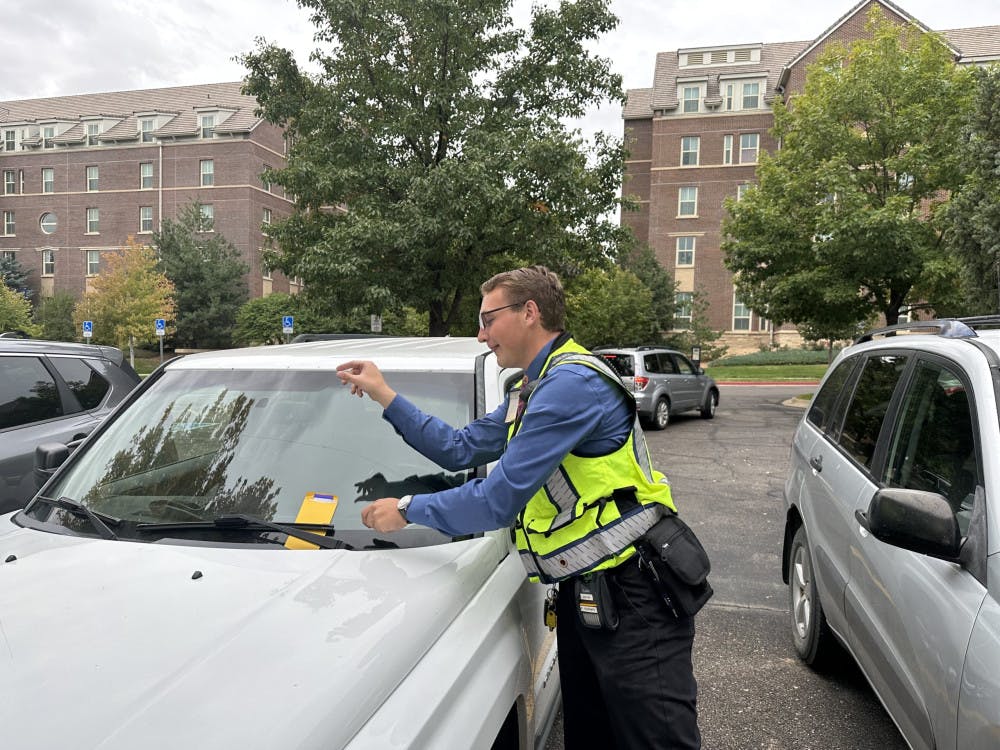On a brisk Friday morning, a man clad in a neon yellow vest and red paisley tie stands in the lot across from North Hall. After searching the windshield of every car for a parking permit, he stops. He has run into a silver Jeep with no permit. He looks up the vehicle on his hand-held device and eventually writes the owner a ticket for not having a permit displayed. The man prints the ticket, puts it in an all-too-familiar yellow envelope, and places it under one of the Jeep’s windshield wipers.
The man in this scenario is Colton Howard, student resource officer team lead for parking services at the University of Northern Colorado. He is one of 12 students employed by UNC’s Parking Services. Employees oversee multiple tasks, like setting up barricades for events, helping people at the Campus Commons information desk, repainting parking lots and putting up signs. A good portion of this work goes unseen by students who only notice parking services employees after they have received a ticket.

“I don’t like writing tickets, but parking rules are so easy to follow,” Howard says.
In his eyes, avoiding a ticket comes down to parking only in the lots you’ve paid for and avoiding designated ADA and service vehicle spots.
Of the over 30 lots on UNC’s campus, only seven are unavailable for students to park in. These remaining lots are reserved for faculty and staff.
UNC’s Parking Operations Manager Stephanie Kostick says that while having separate permits and lots for students and faculty may seem pointless to some students, it makes the process safer and easier.
“Typically, if you just have one permit and anyone can park anywhere, it’s going to look kind of like a Target parking lot at Christmas,” Kostick said.
Removing these separate lots and permits means that staff and students would be fighting over the same parking, which would not benefit anyone.

“They’re going where they need to and they get to class quicker - both of them,” she said. “They may be a little grumpy that they have to park where they’re parking, but it’s quicker and it’s safer for traffic.”
Kostick says there are approximately 5,200 spaces in student lots, not including ADA, service vehicle and loading vehicle spaces. Students like Kaleigh Grizzle still don’t believe this is enough to accommodate everyone. Grizzle, a junior theater education major, says that she struggles to find a spot in the K-West lot by Kepner Hall or in front of Frasier Hall multiple times a week. Although it’s inconvenient for her, she usually solves that problem by parking slightly further away and walking to class.
But Grizzle’s primary issue with parking at UNC is not the lack of spots, but the cost.
“I think the price is outrageous,” Grizzle said.
She says that the school’s annual student permit price of $314 is too high. Like many students, Grizzle also does not know where that money is going and why the price continues to increase without explanation.
So where does all the money from parking permits and citations go?
Simply put, all the revenue from permits and citations goes back into parking. Those funds make it possible to maintain parking lots, provide new construction, and pay employees working for parking services.
Because of a state statute, parking at all Colorado campuses must be self-maintaining. Tax revenue, tuition fees, and state funds can not be put towards parking.
Kostick says that the permit price is largely based on what it has been historically and goes up occasionally to accommodate the cost of what parking services have to pay for. The permit in Fall 2022 and 2023 cost students $314. During Fall 2021 and 2020, the permit only cost $285 for the full year.
Kostick says there are cheaper options for UNC students like the Y-Lot pass, which places students slightly further away from classes, but boasts a much lower price at only $198. Y-Lot is located by the Cesar Chavez Center at the edge of west campus.
In comparison, Colorado State University charges between $208 to $704 for residence hall parking permits and between $266 to $600 for student commuter passes. The University of Colorado Boulder student annual parking pass costs $480.
After learning what parking revenue goes to, Grizzle says she understands, but still does not believe the price of the permit is justified, nor does she understand the price increase.
“I’ve only ever seen them work on a parking lot twice and it was both this semester, and it was only one lot,” she said. “Doesn’t make sense why it needs to be over $300 per student.”
For the foreseeable future, anyone who wants to park on UNC’s campus will be forced to deal with buying a permit or chancing a parking ticket without one. While the potential for getting a citation is upsetting to some, parking services ask that others remember who is really giving out the tickets.
“We’re just students,” said Olivia Laster, another student resource officer.
According to Howard, the resource officers with parking services are not hiding in the bushes waiting to ambush students with tickets.
“We’re not there to get ya,” Howard says. “We’re just doing our jobs.”
Though understanding where parking fees are going may help students feel better about spending that money, it will never fully dull the disappointment of seeing a yellow parking envelope neatly placed on a windshield.







